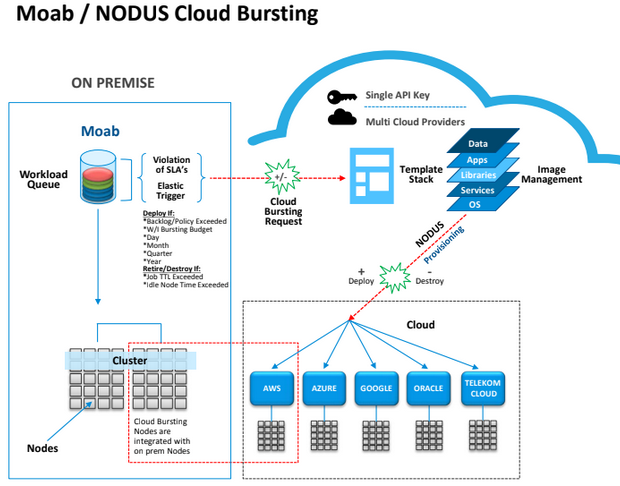* – This article has been archived and is no longer updated by our editorial team –
Adaptive Computing has provided advanced applications and tools to the world’s largest High-Performance Computing installations for over a decade. Their mission is to enhance performance, improve efficiency and reduce costs. Adaptive has over 200 Fortune 500 and top 500 supercomputing customers in the world’s most demanding IT environments.
Below is our recent interview with Art Allen, President of Adaptive Computing:
Q: What makes Adaptive Computing unique in the market?
A: Adaptive Computing recently launched the Moab/NODUS Cloud Bursting Solution which allows HPC Systems to “burst” additional workloads to an external cloud on-demand. It offers increased productivity to both commercial industry and research organizations by eliminating backlog and insuring that SLA’s are met automatically.
Q: Why is this approach to cloud bursting different?
A: This solution has several advantages, including the ability to burst to multiple cloud providers (Oracle, AWS, Google, Azure, Telekom Cloud, etc.) and bare metal provisioning. Cloud resources are automatically deprovisioned from the cloud provider when no longer needed. The Moab/NODUS Cloud Bursting Solution allows bursts to be done in blocks of nodes, or based off the highest priority job. Cloud nodes are totally dynamic inside of Moab, with no need to predefine them ahead of time. Usage limits for bursting can be set on a daily, weekly, quarterly, and yearly basis. This simple, yet powerful solution is automated, with no admin/user interaction, and integrates seamlessly with existing management infrastructure.
Q: Tell us more about Moab and NODUS.
A: Adaptive Computing’s Workload and Resource Orchestration software platform, Moab, is a world leader in dynamically optimizing large-scale computing environments. Moab intelligently places and schedules workloads, and adapts resources to optimize application performance, increase system utilization, and achieve organizational objectives.
The NODUS provisioning platform has the capability to integrate seamlessly with existing management infrastructure, and is designed for provisioning, control and configuration of any on-premise or cloud infrastructure. It offers granular control of resources, whether they are cloud or on-premise.
Q: What benefits does NODUS offer?
A: HPC organizations that utilize cloud service providers in conjunction with NODUS can significantly reduce their on-premise cluster sizes and costs by as much as 40-50 percent and burst the rest of their HPC workload to the cloud, by implementing this hybrid approach. Each workload that is run in the cloud can be matched with the exact hardware stack that is best suited for that workload. This approach will assure all workloads are completed in the timeliest and most cost-efficient manner, typically saving millions of dollars on “on-premise” HPC cluster capital expense. These savings can be moved to a manageable cloud-bursting op-ex cost (pay-as-you-go). With the reduction of on-premise HPC cluster sizes, additional savings are achieved by reducing power consumption, cooling costs and support personnel.
Adaptive/NODUS HPC as a Service delivers faster time to market and reduces HPC costs by allowing organizations to increase the capacity of their HPC Data Centers and run jobs in the cloud. HPC as a Service also enables greater system flexibility since it eliminates the need for dedicated hardware resources per application and allows dynamic allocation of resources per given task.
Adaptive/NODUS Cloud Bursting for Disaster Recovery allows for continuous operation in the event of a failure by spinning up stacks in multiple regions and bursting into multiple clouds. The failover can be configured by the user to happen automatically or manually, and it can access to data that has been replicated in multiple locations.
Q: What markets (industries, verticals, applications) is this suited for?
A: Cloud bursting is applicable across virtually all the HPC markets and verticals. Any organization that needs elastic HPC capacity on demand is a potential user. We are seeing a significant interest from the commercial sector and HPC in the Enterprise. Our verticals include:
• Research
• Higher Education
• Transportation
• Defense
• Oil and Gas
• Telecommunications
• Manufacturing
• US Federal Government
• Cloud Services Providers
• HPC Hardware Manufacturers
 Recommended: Cloud Based HR Software Provider WebHR Aims To Revolutionize The Way HR Works
Recommended: Cloud Based HR Software Provider WebHR Aims To Revolutionize The Way HR Works
Q: How does what you are doing stack up against the competition?
A: In our view, there is no competition to NODUS because our competitors do not offer fully automated, workload and policy-aware bursting. Our competitors are manually driven. NODUS is the exact opposite of that, being fully automated.
Other HPC schedulers are attempting to enable HPC Cloud Bursting, but Moab/NODUS is the only one with a single-point solution for solving HPC Cloud Bursting.
Q: What can we expect from Adaptive Computing in the future?
A: Adaptive Computing’s mission is to bring higher levels of decision, control, and self-optimization to the challenges of deploying and managing large and complex IT environments, resulting in accelerated business performance at a reduced cost. Adaptive’s NODUS Cloud Bursting Solution is part of an ongoing plan to increase our footprint in the HPC market. We foresee increasing demand in Machine Learning, Artificial Intelligence, Genomic and Medical Research, High-Tech Manufacturing, and other HPC-GPU areas.
Activate Social Media:


 Recommended:
Recommended: 